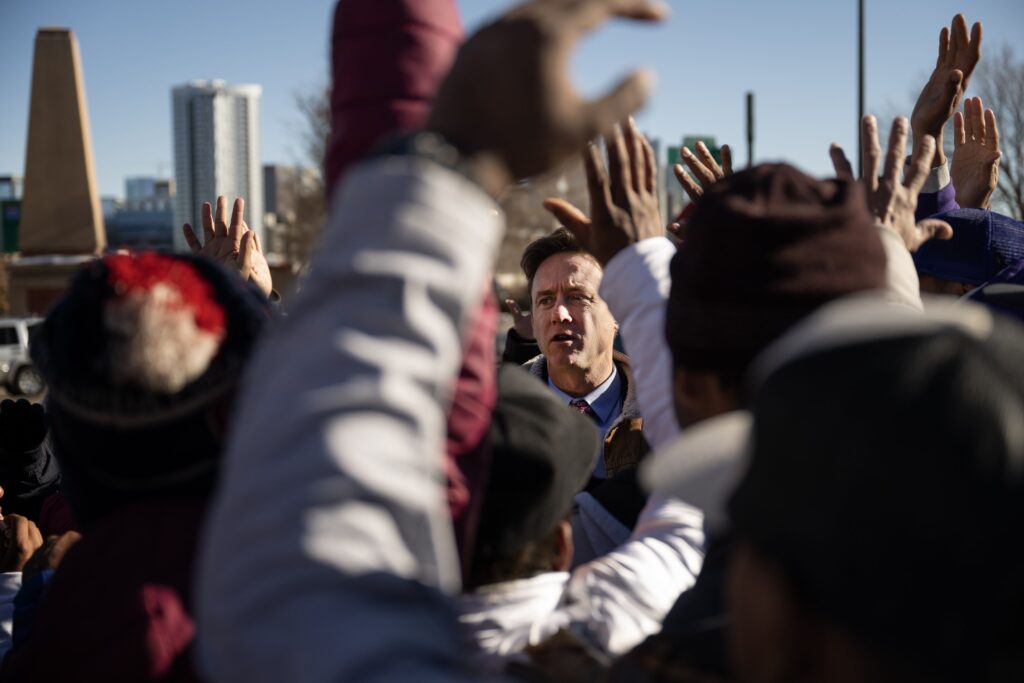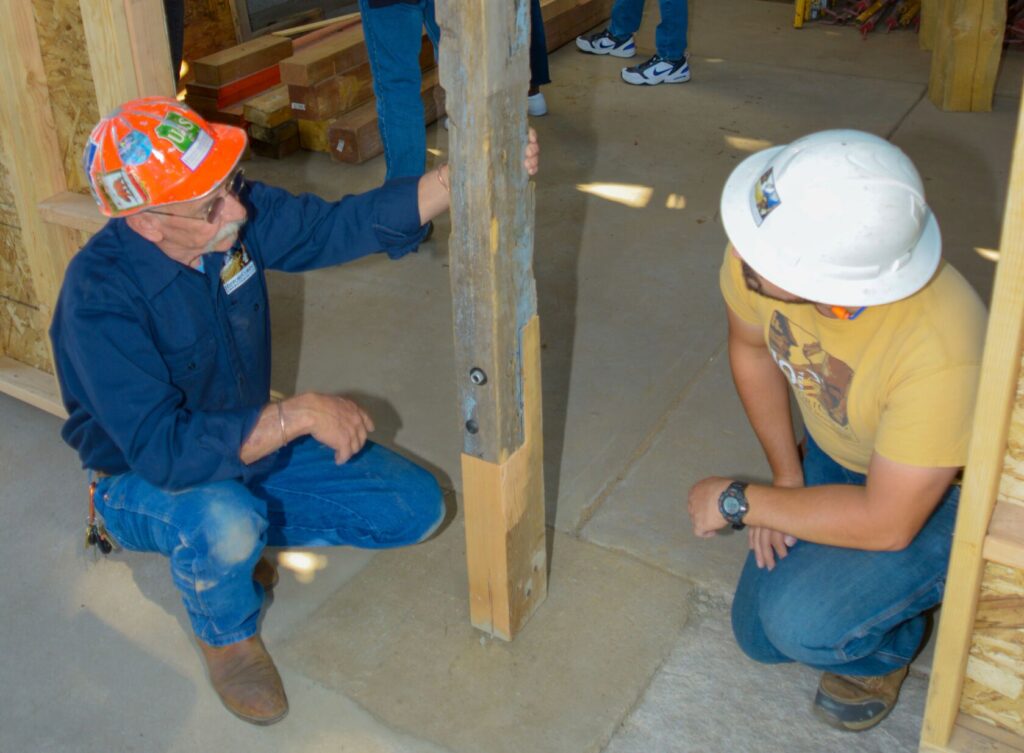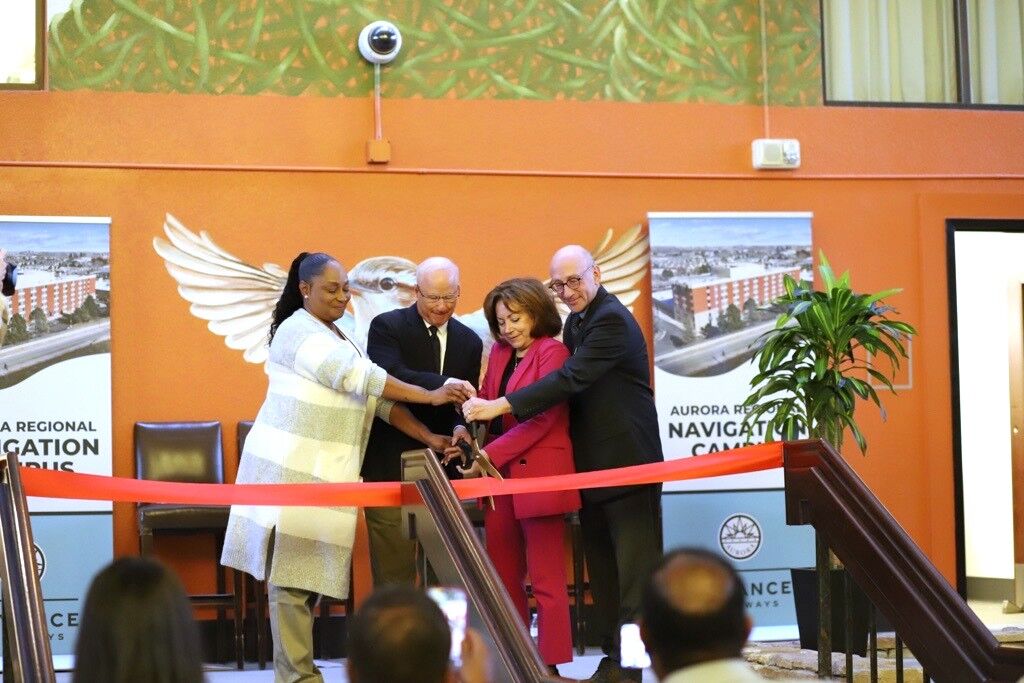Former Fort Carson soldier set for deportation removed from Aurora facility
At 5 a.m. Thursday, things got real for Jose Barco.
Just before daybreak, he was rousted out of his bunk at the Aurora Immigration and Customs Enforcement Processing Center and whisked off in a van bound for Denver International Airport. He was allowed to bring the clothes he was wearing and his Venezuelan birth certificate.
Barco was not allowed to gather his toothbrush or the soap and thin washcloth he bought at the commissary the day before.
Once at DIA, ICE agents wearing civilian clothes bought the decorated veteran his first taste of freedom since he was incarcerated 15 years ago — a McDonald’s meal. He was then escorted by ICE on a flight to El Paso, Texas, unrestrained except for the airplane seatbelt.
The handcuffs and leg shackles came out in El Paso, where Barco was driven to a detention center in Pearsall, Texas, a privately operated facility that houses detainees for ICE.
Once inside, he was led to a warehouse-like room with 20 other detainees, who recognized his military haircut, sneered, and yelled “Carne fresca!!”
In Spanish, that means “fresh meat.”
Going on rumors
Things happen in the Aurora facility in the dark hours.
Barco, who speaks Spanish, was in his bunk when 30 or so immigrant men were rounded up at 3 a.m. two weeks ago and driven to El Paso to await the next phase of their deportation.
He heard that they were bound for Guantanamo.
He knew their stories. They told him that they had been housed in the facility for 30 to 60 days before they were shipped out.
However, unlike the others, Barco’s case seemed to be expedited, and instead of being driven to Texas, he was flown in a commercial plane.
He was at the Aurora facility for less than a month before this week’s abrupt exit. His case was complicated more when, just as politicians and attorneys were gathering to help delay his departure, he waived his appeal. According to his older sister, Veronica Barco, he didn’t want to be a burden to anyone.
One soldier offered up money from the sale of his home to pay the cost of an immigration attorney. A commander wrote the Army to attest that he filled out and mailed his citizenship papers between tours. The department lost the paperwork.
Barco’s story
Barco, who signed up at the age of 17, was a member of the U.S. Army’s 2nd Battalion, 12th Infantry Division — the subject of a documentary that detailed the trauma of the returning Iraq War-era soldiers who nicknamed themselves “Lethal Warriors.”
The battalion of 500 accounted for half of Fort Carson’s combat losses in Habbaniyah, a village between Fallujah and Ramadi in the heart of the Sunni Triangle for their first tour in 2004 and in Baghdad’s Dora neighborhood for the second, which lasted 15 months.
Upon his return to Fort Carson, suffering from Post Traumatic Stress Syndrome and a traumatic brain injury, and reliant on half a dozen medications and alcohol, he had a flashback one night, shot into a crowd and injured a pregnant woman in the leg. He was convicted of attempted murder and sentenced to 52 years in prison, but got out in 15 because of good behavior.
“Jose isn’t the only member from his unit who served or is serving time after their Iraq deployment for violent crimes. Over 30 others have committed suicide,” said Veronica Barco. “The only difference is that he wasn’t a United States citizen when he went to war for this country. While the others are on parole, he is being deported.”
“It’s insane,” said Ryan “Doc” Krebbs, the battalion medic who tended to the wounded on Veterans Day in 2004 and now lives in the Denver area. “It’s like they’re trying to make him disappear from the earth.” Krebbs was the last person to talk with Barco on the phone the night before he was sped away.
Barco considers himself star-crossed. His elation at receiving early parole turned to dread. His parole date happened to fall on Jan. 21, 2025, a day after President Trump was sworn in and vowed to carry out his promise to “double down on migrants poisoning the country” and conduct the largest mass deportation in the country’s history.
Since Jan. 21, a band of brothers from Barco’s platoon has been on a text chain, working against a schedule only the government knows for sure.
“The government is operating in a very clandestine manner,” said Danitza James, president of Repatriate Our Patriots, who spoke with Barco on Friday morning. Barco has some money ponied up by family and friends, which enables him to make phone calls, but only until he leaves for his final destination, wherever that is. “He sounded so hopeless but he was hanging in there.”
James, a combat veteran who served with a green card and is now a citizen through marriage, joined the nonprofit in 2019, when she realized she could have been one of the at least 400 non-citizen veterans who have been deported or are at risk of being deported since the Iraq War.
Behind the guarded walls
Last Saturday, Krebbs and a reporter parked on the street outside of the Aurora ICE Processing Center, gave up their phones and any possible weapons, and met Barco in the stark visiting area, which is a long shadowed hallway dotted by open cubbies. In each partition are two plastic chairs placed before a 4-foot by 6-foot window.
“Man, I miss you, dude,” Krebbs told Barco on a black phone provided on each side of the window. Their conversation, Krebbs suspected, was being recorded.
Around them were half a dozen families designated with an hour to talk. Sisters and brothers sat on the free side of the window, arm in arm, possibly seeing their loved one for the last time.
In a prison-like atmosphere that banned any sort of touching, mothers placed sleeping babies wrapped in blankets on a shelf just low enough for the inmates on the other side of the window to see.
One father crammed his body on top of his shelf and made silly faces at his 18-month-old son, who was too young to know that this was anything other than normal. They pressed their hands like mimes on the window in a gesture of love, as the big sister chased toy cars and action figures hastily dropped on the concrete floor.
An uncertain road ahead
“You ready for the road ahead?” Krebbs asked Barco, who nodded not taking his eyes off of his former medic.
Barco’s face has changed from his Army regulation photo. Twenty years older than the determined 18-year-old in camouflage, he still has a closely cropped soldier haircut and his muscled shoulders strain the red polo shirt from 15 years of lifting weights in prison. The scars on his hands are a reminder of Veterans Day 2004, when he lifted a burning suicide car off of two soldiers, saving them from the flames before he realized he was on fire.
The sides of his eyes crinkled, his skin was clear and his laugh was easy. He was animated as he explained to “Doc” — Krebbs — why he gave up on his appeal. Immigration attorneys gave no guarantees for a case which may take years and thousands of dollars to fight.
It was the first decision he had made on his own since he entered prison 15 years ago. It felt right at the time, but he’s having second thoughts.
The two talked like two men sharing a beer.
Barco is tired.
“Doc” assured him he didn’t blame him for giving up a fight he felt he couldn’t win.
However, his surrender means deportation to Venezuela, a country that, he said, “is so foreign to me. I’ve no family. No connections. Nothing.”
At his immigration hearing two weeks ago, a judge asked canned questions.
Was he a U.S. citizen? No.
Was he a veteran? Yes.
Were you convicted of attempted murder? Yes.
Are you afraid to go to Venezuela? No.
Barco doesn’t know where he’s going to end up and what will happen once he gets there, “dumped like trash,” as his sister, Veronica Barco, described his situation.
On a Signal conversation titled “Jose Barco,” she, veterans’ advocates and a group of his friends are still scrambling. They’ve gone through two lawyers who dropped out as he traveled south. The one from Colorado doesn’t have a Texas law license and Texas attorneys are too busy with other clients to take him on.
Krebbs is writing Gov. Jared Polis for an outside chance of a pardon for the former Fort Carson soldier who served his country and served his time only to find out his citizenship papers were lost.
One day, Barco has hope and the next he’s defeated.
“They’ve set me up for failure,” he said through the black, plastic phone wired to the wall.
Krebbs had plans to bring documents to help Barco receive VA benefits, but ICE had other ideas.
Barco’s wife, Tia, from whom he has been estranged since he went to jail, may drive from Houston to the detention center near San Antonio in a race against time with his Purple Heart and his 16-year-old daughter, who is said to be his spitting image.
As his former commander, Michael “Hutch” Hutchinson, sees it, on paper Barco is a villain, but for the soldiers who know his story, he is a hero who served his country and served his time.
They’re befuddled and they’re angry “considering the pardons done by both presidents,” said one post on the Signal chain.
To his brothers in arms, surrender is not an option.
“His brothers in arms have jumped into action just as they would have if they were still in combat all of those years ago,” said James. “This is what leaving no soldier behind means.”










